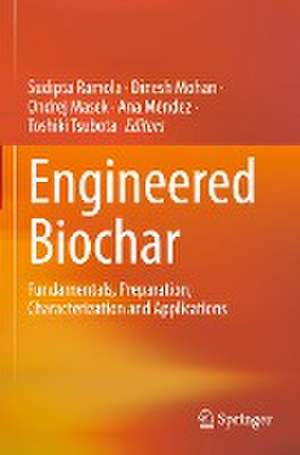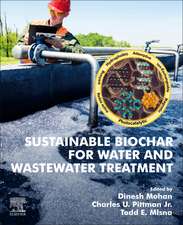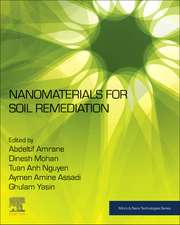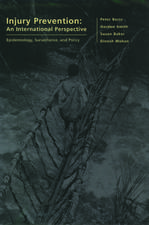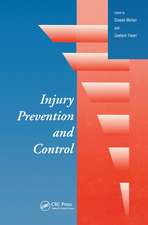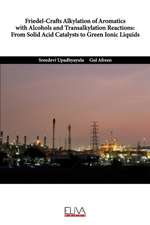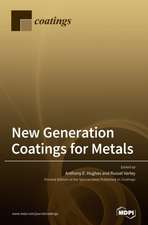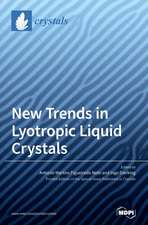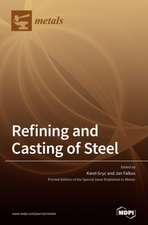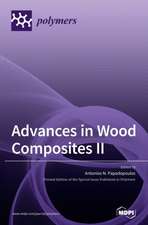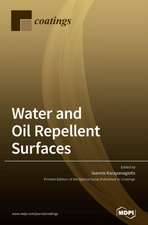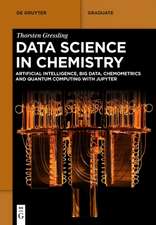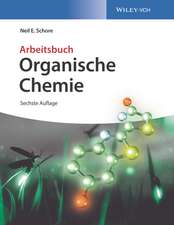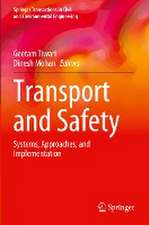Engineered Biochar: Fundamentals, Preparation, Characterization and Applications
Editat de Sudipta Ramola, Dinesh Mohan, Ondrej Masek, Ana Méndez, Toshiki Tsubotaen Limba Engleză Paperback – 10 aug 2023
This book systematically covers the fundamentals and applications of modified biochar. The 19 chapters are divided into 3 sections that provide a holistic overview for researchers from all related fields. Section 1 and 2 present the pyrolysis process, including the advantages and limitations of the physical, chemical, and biological modification methods and characterization of modified biochar. Section 3 highlights the wide spectrum of applications of modified biochar in fuel cells and batteries, remediation of organic and inorganic contaminants from soil and water and soil fertilization. Given its scope, the book appeals to a broad readership in various fields of chemical engineering, materials science, and environmental science.
| Toate formatele și edițiile | Preț | Express |
|---|---|---|
| Paperback (1) | 1384.75 lei 6-8 săpt. | |
| Springer Nature Singapore – 10 aug 2023 | 1384.75 lei 6-8 săpt. | |
| Hardback (1) | 1390.73 lei 6-8 săpt. | |
| Springer Nature Singapore – 10 aug 2022 | 1390.73 lei 6-8 săpt. |
Preț: 1384.75 lei
Preț vechi: 1688.72 lei
-18% Nou
Puncte Express: 2077
Preț estimativ în valută:
264.96€ • 277.39$ • 219.25£
264.96€ • 277.39$ • 219.25£
Carte tipărită la comandă
Livrare economică 05-19 aprilie
Preluare comenzi: 021 569.72.76
Specificații
ISBN-13: 9789811924903
ISBN-10: 9811924902
Pagini: 381
Ilustrații: VII, 381 p. 36 illus., 23 illus. in color.
Dimensiuni: 155 x 235 mm
Greutate: 0.55 kg
Ediția:1st ed. 2022
Editura: Springer Nature Singapore
Colecția Springer
Locul publicării:Singapore, Singapore
ISBN-10: 9811924902
Pagini: 381
Ilustrații: VII, 381 p. 36 illus., 23 illus. in color.
Dimensiuni: 155 x 235 mm
Greutate: 0.55 kg
Ediția:1st ed. 2022
Editura: Springer Nature Singapore
Colecția Springer
Locul publicării:Singapore, Singapore
Cuprins
Pristine biochar and engineered biochar.- Waste to wealth: types of raw materials for preparation of biochar and their characteristics.- Biochar preparation by different thermo-chemical conversion processes.- Physical treatment for biochar modification.- Chemical treatment for biochar modification.- Biological treatment for biochar modification.- New trends in pyrolysis methods.- Characterization of engineered biochar.- Engineered biochar in electrochemistry: fuel cells and batteries.- Engineered biochar as adsorbent for removal of heavy metals from aqueous and soil medium.- Engineered biochar as adsorbent for removal of emerging contaminants from aqueous and soil medium.- Engineered biochar as soil fertilizer.- Engineered biochar as growing media component.- Engineered biochar as sink for soil carbon sequestration.- Engineered biochar as gas adsorbent.- Engineered biochar as host for soil microbiota.- Engineered biochar as supercapacitors.- Engineered biochar as catalyst.- Engineered biochar as construction material.- Engineered biochar as feed supplement and other husbandry applications.
Notă biografică
Dr. Sudipta Ramola is working at College of Chemical Engineering, Zhejiang University of Technology, in association with Zhejiang Academy of Agriculture Science, China. Prior moving to China, she has completed her Ph.D. degree in Environmental Science from G.B. Pant University of Agriculture and Technology, Pantnagar, India. She has research experience on biochar preparation and its applications for environmental remediation. Currently, she is working on development of modified biochar–clay mineral composite for their applications in wastewater and soil remediation, and has also received a ‘Young Scientist’ award for her outstanding research work. She has teaching experience of more than 3 years at undergraduate and postgraduate level. She has published a number of peer-reviewed scientific research articles in various journals of high rank. Further, she has research interests in engineered biochar and its advanced applications, nanotechnology, process development and optimization, and large-scale applications of biochar.
Dinesh Mohan is a full professor in the School of Environmental Sciences at Jawaharlal Nehru University. He is an Elected Fellow of Royal Society of Chemistry (FRSC), London and National Academy of Agricultural Sciences (NAAS). He is also an adjunct professor at Chemistry Department, Mississippi State University, USA. He is a visiting professor at faculty of Environmental Sciences, Czech University of Life Sciences Prague, Czech Republic. He was an adjunct professor at International Centre for Applied Climate Science University of Southern, Queensland, Australia. He has completed his Master and Ph.D from Indian Institute of Technology Roorkee (IITR). Prof. Mohan also worked as a Postdoctoral Associate at Penn State University (1997) for 2 years and Mississippi State University (2005) for more than two years. For the last more than 26 years, he is involved in various research activities including wat^40,000 and h factor: 75) in the high impact factor Journals.
Dr. Mohan has been recipient of a number of academic and professional recognitions, including 2007 Scopus Young Scientist Award (given by Elsevier), Hiyoshi Environmental Award 2009 given by Hiyoshi Corporation Japan, USQ 2017 Research Giant by University of Southern Queensland, Australia, Clarivate Analytics India Research Excellence Citation Awards 2019. He has been named as Outstanding Scientist by CSIR, India. He has received global recognition as the Clarivate Highly Cited Researcher in 2014, 2015, 2016, 2017, 2018, 2019, 2020 and 2021. He has been named to the World’s Most Influential Scientific Minds 2014 and 2015 published by Thomson Reuters. He is also listed in Two Categories among Elsevier’s list of most Highly Cited Researchers 2016 developed for Shanghai Ranking's Global Ranking of Academic Subjects. He is listed TWICE in the list of most cited researchers selected from academic researchinstitutions worldwide in Environmental Science and Engineering as well as in Chemical Engineering.
Dr. Ondřej Mašek is a Reader in Engineering Systems at the School of GeoSciences at the University of Edinburgh. He is a co-founder of the UK Biochar Research Centre (UKBRC) where he leads the biochar engineering research group and manages a set of unique biochar development and production facilities that he established. His research focuses on development of processes and technologies for sustainable and efficient production of biochar, as well as engineering of biochar for a range of applications, including, but not limited to carbon storage, environmental management, polymer additive, construction material additive, etc. Dr Mašek is actively engaged with the emerging biochar industry, helping to develop new products and solutions for carbon removal and circular economy. He is behind the development of a set of standard biochar materials that have been extensively used by the global research community over the past ten years, with more than 150 research groups benefiting from it to date. He has published over 115 peer-reviewed papers with nearly 4000 citations.
Dr. Ana Méndez is Professor of Materials Science and Metallurgical Engineering in the Mines and Energy School at the Universidad Politécnica de Madrid Spain. Her research is focused on carbon materials. She has a wide experience in the preparation, characterization, and environmental uses of biochar. He has done research stays at University of Lisbon and University of Porto (Portugal), RMTI Melbourne (Australia), Université Catholique de Louvain (Belgium), and Centre de Recherche sur la Matière Divisée CNRS (France). She has published 80 papers in journals included in the JCR. Recently,she has focused her research in engineering biochar for catalysis and
their use in hydrometallurgical processes.
Dr. Toshiki Tsubota is working as Associate Professor at Department of Materials Science, Faculty of Engineering, Kyushu Institute of Technology, Japan. He has obtained his Ph.D. degree in Materials Science from Kyushu University, Fukuoka, Japan. He has worked in some kinds of research fields, such as oxides for thermoelectric material, synthesis of CVD diamond, chemical modification of diamond surface, carbon material for electric double layer capacitor. Currently, he is studying the valuable usage of biochar from biomass such as bamboo. He is a permanent secretary of Japan Biochar Association. He is now Chairman of Kyushu branch of the Surface Finishing Society of Japan (from April in 2020 to March in 2022). He will be a director of the Surface Finishing Society of Japan (from April in 2022 to March in 2024). He has published more than 120 peer-reviewed scientific research papers (total citations: 4360 and h factor: 31,in March 2022) in various journals of high rank.
Dinesh Mohan is a full professor in the School of Environmental Sciences at Jawaharlal Nehru University. He is an Elected Fellow of Royal Society of Chemistry (FRSC), London and National Academy of Agricultural Sciences (NAAS). He is also an adjunct professor at Chemistry Department, Mississippi State University, USA. He is a visiting professor at faculty of Environmental Sciences, Czech University of Life Sciences Prague, Czech Republic. He was an adjunct professor at International Centre for Applied Climate Science University of Southern, Queensland, Australia. He has completed his Master and Ph.D from Indian Institute of Technology Roorkee (IITR). Prof. Mohan also worked as a Postdoctoral Associate at Penn State University (1997) for 2 years and Mississippi State University (2005) for more than two years. For the last more than 26 years, he is involved in various research activities including wat^40,000 and h factor: 75) in the high impact factor Journals.
Dr. Mohan has been recipient of a number of academic and professional recognitions, including 2007 Scopus Young Scientist Award (given by Elsevier), Hiyoshi Environmental Award 2009 given by Hiyoshi Corporation Japan, USQ 2017 Research Giant by University of Southern Queensland, Australia, Clarivate Analytics India Research Excellence Citation Awards 2019. He has been named as Outstanding Scientist by CSIR, India. He has received global recognition as the Clarivate Highly Cited Researcher in 2014, 2015, 2016, 2017, 2018, 2019, 2020 and 2021. He has been named to the World’s Most Influential Scientific Minds 2014 and 2015 published by Thomson Reuters. He is also listed in Two Categories among Elsevier’s list of most Highly Cited Researchers 2016 developed for Shanghai Ranking's Global Ranking of Academic Subjects. He is listed TWICE in the list of most cited researchers selected from academic researchinstitutions worldwide in Environmental Science and Engineering as well as in Chemical Engineering.
Dr. Ondřej Mašek is a Reader in Engineering Systems at the School of GeoSciences at the University of Edinburgh. He is a co-founder of the UK Biochar Research Centre (UKBRC) where he leads the biochar engineering research group and manages a set of unique biochar development and production facilities that he established. His research focuses on development of processes and technologies for sustainable and efficient production of biochar, as well as engineering of biochar for a range of applications, including, but not limited to carbon storage, environmental management, polymer additive, construction material additive, etc. Dr Mašek is actively engaged with the emerging biochar industry, helping to develop new products and solutions for carbon removal and circular economy. He is behind the development of a set of standard biochar materials that have been extensively used by the global research community over the past ten years, with more than 150 research groups benefiting from it to date. He has published over 115 peer-reviewed papers with nearly 4000 citations.
Dr. Ana Méndez is Professor of Materials Science and Metallurgical Engineering in the Mines and Energy School at the Universidad Politécnica de Madrid Spain. Her research is focused on carbon materials. She has a wide experience in the preparation, characterization, and environmental uses of biochar. He has done research stays at University of Lisbon and University of Porto (Portugal), RMTI Melbourne (Australia), Université Catholique de Louvain (Belgium), and Centre de Recherche sur la Matière Divisée CNRS (France). She has published 80 papers in journals included in the JCR. Recently,she has focused her research in engineering biochar for catalysis and
their use in hydrometallurgical processes.
Dr. Toshiki Tsubota is working as Associate Professor at Department of Materials Science, Faculty of Engineering, Kyushu Institute of Technology, Japan. He has obtained his Ph.D. degree in Materials Science from Kyushu University, Fukuoka, Japan. He has worked in some kinds of research fields, such as oxides for thermoelectric material, synthesis of CVD diamond, chemical modification of diamond surface, carbon material for electric double layer capacitor. Currently, he is studying the valuable usage of biochar from biomass such as bamboo. He is a permanent secretary of Japan Biochar Association. He is now Chairman of Kyushu branch of the Surface Finishing Society of Japan (from April in 2020 to March in 2022). He will be a director of the Surface Finishing Society of Japan (from April in 2022 to March in 2024). He has published more than 120 peer-reviewed scientific research papers (total citations: 4360 and h factor: 31,in March 2022) in various journals of high rank.
Textul de pe ultima copertă
This book systematically covers the fundamentals and applications of modified biochar. The 19 chapters are divided into 3 sections that provide a holistic overview for researchers from all related fields. Section 1 and 2 present the pyrolysis process, including the advantages and limitations of the physical, chemical, and biological modification methods and characterization of modified biochar. Section 3 highlights the wide spectrum of applications of modified biochar in fuel cells and batteries, remediation of organic and inorganic contaminants from soil and water and soil fertilization. Given its scope, the book appeals to a broad readership in various fields of chemical engineering, materials science, and environmental science.
Caracteristici
Provides comprehensive overview of fundamentals and applications of modified biochar Presents current challenges and recommendations for future research Is relevant for environmental scientists, materials scientists, and chemical engineers
